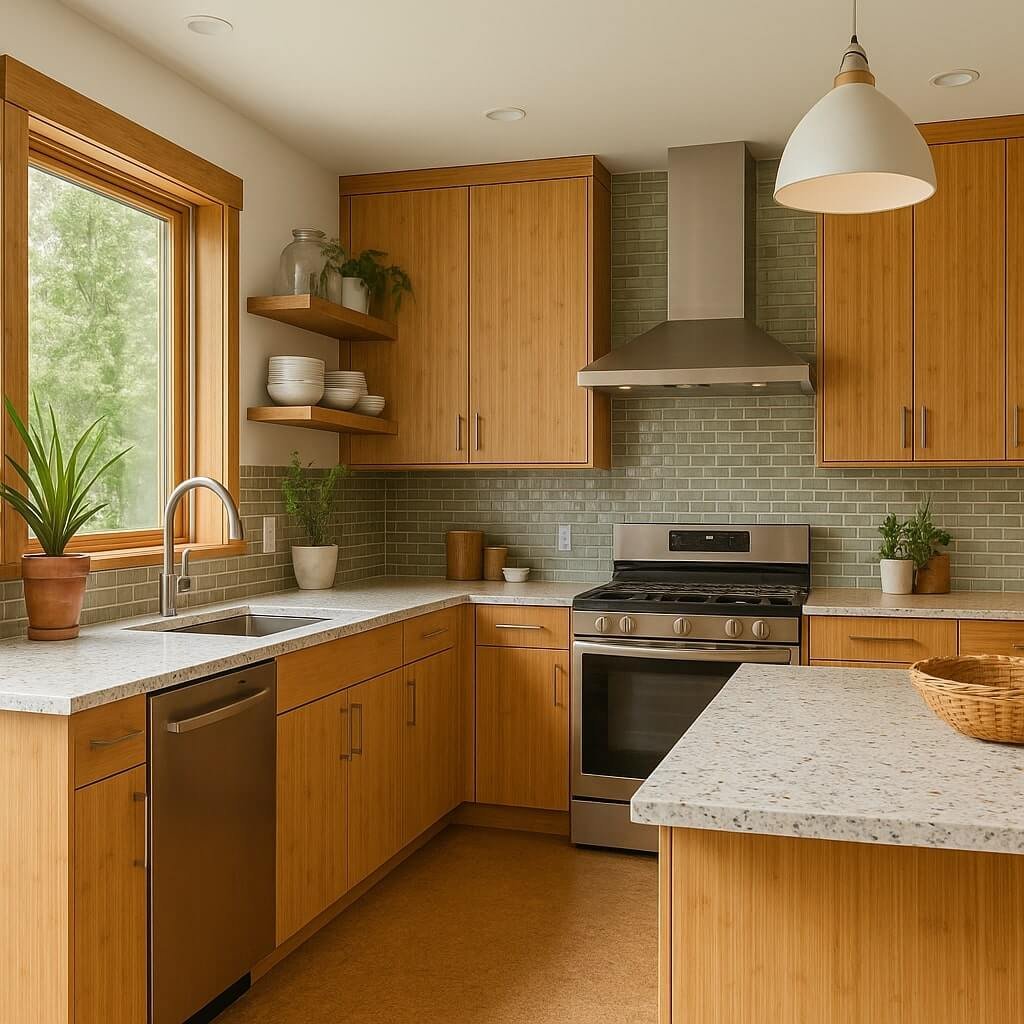Sustainable living begins at home, and one of the best places to start is the kitchen. As the heart of the house, the kitchen uses more energy and resources than nearly any other room. An eco-friendly kitchen remodel not only lowers your environmental footprint but also reduces energy bills, enhances indoor air quality, and boosts your home’s value.
In this comprehensive guide, we explore eco-friendly kitchen remodel ideas that help create a healthier and greener home environment, without compromising on style or functionality.
1. Use Sustainable Kitchen Materials

Recycled or Reclaimed Wood
For cabinets, shelves, or flooring, reclaimed wood offers a unique charm while saving trees and reducing demand for virgin lumber.
Bamboo Cabinets
Bamboo grows rapidly, making it a highly renewable material. It’s sturdy, stylish, and ideal for eco-conscious cabinetry.
Recycled Glass Countertops
Made from crushed recycled glass bound with resin or cement, these countertops are both durable and beautiful.
2. Install Energy-Efficient Appliances
Energy Star Certified Appliances
Choose appliances like refrigerators, dishwashers, and ovens with the ENERGY STAR label. They consume significantly less power and water.
Induction Cooktops
Induction cooking is more energy-efficient than traditional gas or electric stoves and heats faster with less waste.
3. Opt for Low-VOC and Non-Toxic Finishes
Volatile Organic Compounds (VOCs) found in paints, adhesives, and sealants can harm indoor air quality. Use:
- Low-VOC paints and stains
- Formaldehyde-free cabinetry
- Natural oil finishes (like linseed or tung oil)
4. Focus on Water Conservation
Low-Flow Faucets
Install aerated, low-flow faucets to reduce water consumption without sacrificing performance.
Water-Efficient Dishwashers
Choose models with high-efficiency ratings and eco-cycles that use less water per load.
5. Use Recycled or Upcycled Materials
Instead of buying brand new, explore:
- Recycled tiles for backsplashes
- Salvaged hardware (handles, pulls)
- Second-hand sinks or fixtures
Upcycling not only reduces waste but also adds character and uniqueness to your space.
6. Improve Natural Lighting
A well-lit kitchen reduces the need for artificial lighting. Try:
- Skylights or sun tunnels
- Enlarged windows
- Reflective surfaces like glass tiles or light-toned paint
7. Incorporate Eco-Friendly Flooring
Cork Flooring
Sustainable, soft underfoot, and great for kitchens with long-standing periods.
Linoleum
Not to be confused with vinyl, true linoleum is made from linseed oil, jute, and natural resins—100% biodegradable.
8. Use LED Lighting
LED bulbs use up to 80% less energy and last much longer than traditional bulbs. Consider dimmable LEDs for mood flexibility and efficiency.
9. Go for Smart Kitchen Technology
Smart thermostats, leak sensors, and appliance automation can significantly optimise energy and water usage, making your kitchen even greener.
10. Create a Composting and Recycling Zone
Set up designated bins for:
- Organic waste (for composting)
- Recyclables (plastic, glass, metal)
- Non-recyclables
Make it easy and convenient so the whole family can participate.
Frequently Asked Questions (FAQs)
What is the most eco-friendly countertop material?
How can I remodel my kitchen on a budget and still be eco-friendly?
Are gas stoves eco-friendly?
What paint should I use for a green kitchen remodel?
Do eco-friendly remodels increase home value?
Final Thoughts
A greener kitchen remodel is not just a design choice—it’s a commitment to healthier living and responsible environmental stewardship. Whether you’re making small swaps or starting from scratch, every sustainable step helps reduce your ecological impact.
By choosing eco-friendly materials, efficient appliances, and mindful design, you create a beautiful kitchen that’s better for the planet—and your home.



